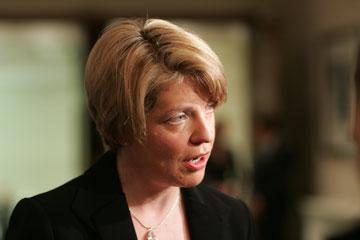No rise in student registration fee this year

A nervous Mary Coughlan drew severe criticism from the opposition in her first committee meeting as Minister for Education yesterday. By Shane Creevy.
Coughlan confirmed that there are no plans to bring in student fees in the lifetime of the present government. However, one new piece of information was made abundantly clear; there will be no rise in the student registration fee for the forthcoming academic year.
Sometimes referred to as a student services charge, many of the Committee members noted their displeasure with the rise of the cost of the charge last year to €1,500, saying that it was "fees by the back door".
(Audio: Senator David Norris, potential presidential candidate, missed a Senate vote to offer his advice to the new Minster for Education; Chairperson Paul Gogarty of the Green Party defends his party.)
{saudioplayer}Norris_Gogarty.mp3{/saudioplayer}
There were no plans detailed on the registration fee for the 2011-2012 academic year and Senator Ivana Bacik, ordinarily not a member of the education committee, voiced her concern over this: “I think there has also been a very real concern among students that the impact of the cuts in student services, [that] the student services have actually deteriorated while the student services charge has increased. So clearly there is no added value to students for paying this charge”.
Brian Hayes, Fine Gael education spokesperson, welcomed An Tánaiste to her new role as Minister for Education. However, he asked her how university buildings were going to be upgraded without significant investment by the State; he suggested at least €4bn would be needed.
Coughlan replied by saying that she wished education spending would rise significantly to cope with the rise in student numbers expected over the next twenty years.
Ruairí Quinn stated his displeasure with the delay of Ms. Coughlan’s pre-meeting document, saying that the debate could have been better informed if more time had been given to go over the details. He then asked if agreement could be reached that 7% of GDP be applied to education.
An Tánaiste said: “Well I certainly don’t disagree with setting a target. [However] if we were to set down a percentage of GDP to be applied to third level education, that might take away from perhaps a new thought process, which is, that we must have alternative ways in which funding should take place in higher education, over and above the exchequer”.
She mentioned such possibilities as philanthropy, efficiency measures within the universities themselves, and, of course, the student contribution.
Senator Brian Ó Domhnaill noted the potential of online learning. There could be significant savings here, he urged, with the added benefit that a potential student from Donegal, for example, could ‘attend’ a course in UCD without leaving their house.
Senator Fidelma Healy Eames voiced her concern that Irish students would be pushed aside as places for postgraduate courses remained static while there was a large influx on non-Irish students into the system.
Chairperson of the Committee, Green TD Paul Gogarty, said that Coughlan could make her legacy felt by distributing free books to all two year olds in the country. The Tanaiste said that such a scheme would not be possible in the current economic climate.
Meanwhile, Ms Coughlan commended the universities for finding efficiency measures, particularly in energy, stating that a group of colleges had saved €1.5bn in electricity charges. She said: “Looking into the longer term there are very significant challenges ahead in ensuring that our higher education system is positioned and resourced so as to be able to meet national demands."
